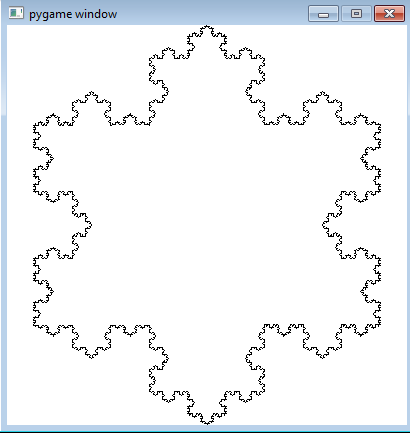I've drawn a Koch snowflake with Python 3. I'm new to the Python world and would appreciate all feedback on how to make the code more Pythonic as I'm not used to these idioms, styles and modules. All other feedback is of course also greatly appreciated.
The snowflake is constantly redrawn in preparation for the future. This main loop is based on the pygame.draw example but feels a bit clunky with done=False;while not done etc.
import pygame
import numpy
from math import pi, sin, cos
# some constants
FPS = 10
WINDOW_SIZE = [400,400]
LINE_WIDTH = 1
MIN_LINE_LENGTH = 1 # when to terminate recursion
# main loop
def main():
# init pygame and window
pygame.init()
screen = pygame.display.set_mode(WINDOW_SIZE)
# loop until user exits
done = False
clock = pygame.time.Clock()
while not done:
# limit frame rate
clock.tick(FPS)
# check if user exited
for event in pygame.event.get():
if event.type == pygame.QUIT:
done=True
# clear screen
screen.fill([255,255,255])
# calculate the three corners of the snowflake,
# an equilateral triangle centered on the screen
screen_center = numpy.array([ WINDOW_SIZE[0]/2, WINDOW_SIZE[1]/2 ])
radius = WINDOW_SIZE[1]/2 # not really radius? but distance from center to corner
snowflake_top = screen_center + vector_from_polar( radius, pi/2 )
snowflake_left = screen_center + vector_from_polar( radius, pi/2 + 2*pi/3 )
snowflake_right = screen_center + vector_from_polar( radius, pi/2 + 4*pi/3 )
# draw the snowflake
draw_koch_line( screen, snowflake_top, snowflake_left )
draw_koch_line( screen, snowflake_left, snowflake_right )
draw_koch_line( screen, snowflake_right, snowflake_top )
# flip buffers
pygame.display.flip()
# vector_from_polar: constructs a vector from its angle and mangitude
def vector_from_polar( magnitude, angle ):
return magnitude * numpy.array( [ numpy.cos( angle ), numpy.sin( angle ) ] )
# draw_koch_line: (approximately) draws a Koch line between the points specified
def draw_koch_line(screen, line_start, line_end ):
if numpy.linalg.norm( line_end - line_start ) / 3 < MIN_LINE_LENGTH:
# last iteration: draw the line
pygame.draw.line(screen, [0,0,0], line_start, line_end, LINE_WIDTH )
else:
# find the normal to this line
line_normal = numpy.array([
line_end[1]-line_start[1],
line_start[0]-line_end[0] ])
# find the three points of the "triangle" used to define the segments
triangle_left = 2/3*line_start + 1/3*line_end # 1/3 of this line
triangle_right = 1/3*line_start + 2/3*line_end # 2/3 of this line
triangle_top = 1/2*line_start + 1/2*line_end + \
numpy.sqrt(3)/2/3 * line_normal # point "above" the line
# recurse for each segments
draw_koch_line(screen, line_start, triangle_left)
draw_koch_line(screen, triangle_left, triangle_top)
draw_koch_line(screen, triangle_top, triangle_right)
draw_koch_line(screen, triangle_right, line_end)
main()

